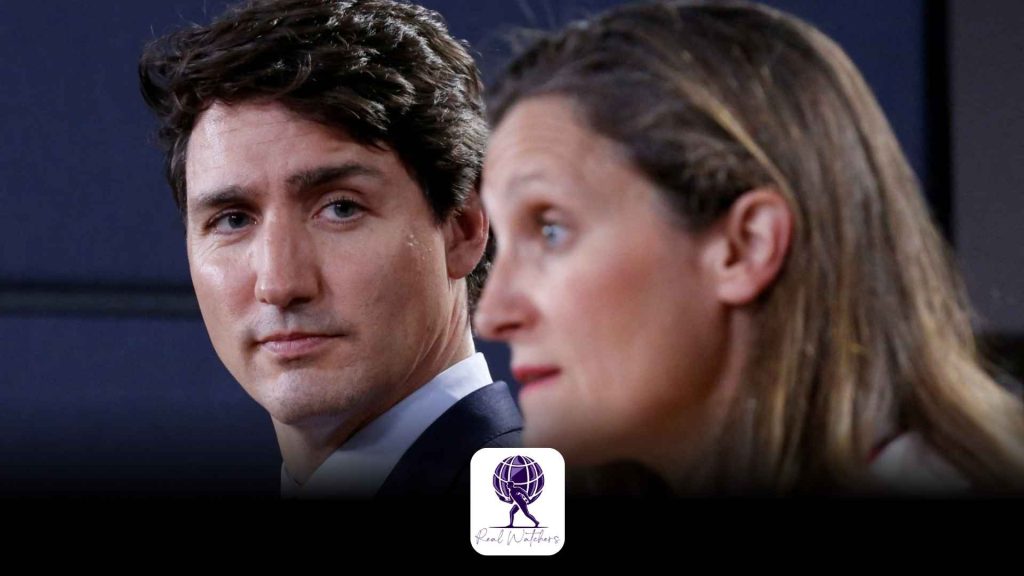Canada’s Finance Minister Chrystia Freeland has resigned in a significant political development.
Her resignation stems from fundamental disagreements with Prime Minister Justin Trudeau regarding the appropriate response to incoming President Donald Trump’s proposed tariffs.
In a letter addressed to Prime Minister Trudeau on Monday, she formally announced her resignation, citing a fundamental disagreement between the two regarding Canada’s optimal direction. She highlighted the significant challenge presented by Trump’s approach to “aggressive economic nationalism.”
Freeland stated that the decision follows Trudeau’s communication last week, in which he expressed his desire for her to step down as his government’s leading economic adviser.
Her resignation occurred just hours before she presented the annual fiscal government update in parliament.
The decision could potentially drive Trudeau’s tenuous minority government to a critical juncture.
Following nearly a decade in office, the prime minister is encountering increasing pressure to step down amid worries that his leadership may be hindering his party’s prospects. According to a recent poll tracker, the Liberal leader’s approval rating has seen a significant decline, dropping from 63% at the time of his election to just 28% in June of this year.
In the wake of Freeland’s departure on Monday, five sitting Liberal MPs have publicly urged Trudeau to resign.
Helena Jaczek, an MP representing Markham-Stouffville in Ontario, expressed her concerns to reporters, stating, “Firing the minister of finance who has served you extremely well is not what I’d call a trustworthy move.” She went on to call for Prime Minister Trudeau’s resignation.
An urgent meeting of the Liberal caucus has been scheduled for 1700 local time (22:00 GMT).
Shortly after Freeland’s announcement, Public Safety Minister Dominic LeBlanc took the oath of office as her successor. LeBlanc, a long-time friend of the prime minister, is regarded as one of his most steadfast supporters.
Prime Minister Trudeau attended the swearing-in ceremony, marking his first media appearance following Freeland’s announcement. However, he refrained from making any statements during the event. The BBC’s request for comment went unanswered by both his office and the finance department.
In a resignation letter made public, Freeland emphasized the importance of Canada maintaining its “fiscal powder dry” in anticipation of potential sweeping tariffs from US President-elect Donald Trump.
She stated that this signifies a rejection of expensive political strategies that Canada cannot sustain.
Former President Trump has pledged to implement a 25% tariff on goods imported from Canada, a move that economists caution could have serious repercussions for the Canadian economy.
Freeland characterized the tariffs as a “threat” that warrants serious attention and consideration.
She emphasized that this entails a concerted effort to counteract ‘America First’ economic nationalism and collaborate to address the looming tariff threats.
On Monday afternoon, the autumn economic statement was unveiled. It disclosed a staggering C$60 billion deficit ($42 billion; £33 billion), significantly surpassing Freeland’s C$40 billion target.
Reports indicate that she and Trudeau were at odds over the prime minister’s recently proposed policies to tackle the nation’s cost-of-living crisis.
The government’s plan to distribute funds to every Canadian earning less than C$150,000 annually includes a cheque of C$250. The federal government anticipated that these cheques would cost C$4.68 billion.
A temporary tax break on essential items during the holidays is expected to result in a loss of C$1.6 billion in tax revenue.
Freeland’s office has raised concerns about the financial implications of the two policies, which it argues may be economically imprudent given the escalating national deficit.
The tax holiday has received approval from the House of Commons; however, the distribution of C$250 cheques faces a challenge as the New Democratic Party (NDP), a center-left faction in parliament, indicated it would withhold support for the initiative unless it undergoes expansion.
A recent poll by the Angus Reid Institute revealed that 80% of Canadians perceive the distribution of cheques as a strategic political maneuver aimed at garnering public favor amid a decline in Prime Minister Trudeau’s popularity.
Following Freeland’s departure, Pierre Poilievre, the leader of the opposition Conservative Party of Canada, urged a federal election to be held as soon as possible.
Chaos is reigning supreme. “We simply cannot continue in this manner,” he stated, noting that her resignation arrives “at the most inopportune moment.”
NDP leader Jagmeet Singh has urged Prime Minister Trudeau to step down from his position. However, Singh, whose party has supported Trudeau’s minority government to this point, refrained from pledging to a non-confidence vote, which would essentially trigger a federal election.
As deputy prime minister, Freeland has consistently been regarded as one of Trudeau’s most trusted allies within the Liberal party. Since 2020, she has served as Canada’s finance minister, playing a crucial role in guiding the nation through the challenges posed by the pandemic and its subsequent recovery.
Following her resignation, other members of the Liberal Party’s cabinet have responded.
Minister of Transport Anita Anand referred to Freeland as a “good friend,” stating, “This news has hit me hard, and I’ll reserve further comment until I have time to process it.”
The Business Council of Canada said Freeland’s resignation is “deeply troubling,” raising questions about “whose interests the federal government is looking out for. “
In an unexpected turn of events, Canada‘s public broadcaster, CBC, has revealed that Freeland’s decision to resign was a surprise, according to a senior federal government source.
Freeland has confirmed her intention to remain a Liberal member of parliament and plans to seek re-election in the forthcoming Canadian election, which is scheduled to take place on or before October.
The resignation follows the announcement from another cabinet member, housing minister Sean Fraser, who stated he would not pursue re-election to dedicate more time to his family.








